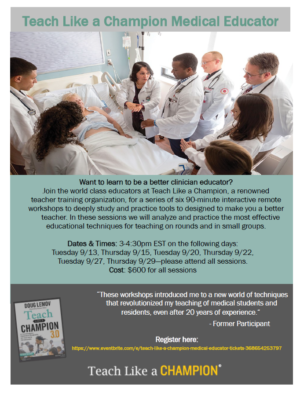08.24.22Workshop: Helping Medical Educators Become Master Teachers
In September, we’ll be offering our first workshop for medical educators. Our purpose is to study techniques that can help people in the medical field teach more effectively and more productively. Yes, we borrow from outstanding K-12 examples… but we also study real world examples of how doctors are taught. This video of University of Pittsburgh and Brown University professor Missy McNeil is a good example.
Among the techniques demonstrated here and which we’ll study:
The first thing McNeil does is to ask her students to summarize the case at hand in writing. This technique is called Everybody Writes, and it causes everyone to answer the question and everyone to think more deeply about it. She emphasizes this by letting them choose only five key case details to include. We have to prioritize! In our workshops we’ll discuss ways to include short regular bouts of writing to help build memory and support critical thinking as Missy does here.
Next McNeil is able to quickly transition to a discussion about what to prioritize and why. She starts this conversation with a Cold Call–this establishes a combination of voice equity and supportive accountability. Voice Equity means the conversation isn’t dominated by the most eager and the constant talkers. Everyone at some point is invited into the conversation. Everyone gets both the right and the responsibility to discuss the case. And everyone has to be on their toes because it always could be them who’s called on. For example when she asks (at about 2:20): What does “Volume overload mean in terms of body homeostasis?” everyone answers the question because it’s clear she’s going to choose regardless of who volunteers. Matthew gets the chance to talk through the answer but the battle’s already won because everyone in the room has prepared an answer. As educators (and consumers of medical expertise) we want this! We want doctors as cognitively engaged as possible. But notice also all the steps McNeil has taken to ensure that students are successful. She gives Wait Time, she’s let them think in writing first, she asks the question in an easy going warm manner.
Notice also the “culture of error”: How McNeil makes it psychologically safe for students to reveal when they don’t know–the warm laughter and briefly playful tone in response to Matthew’s answer; the fact that he so readily admits he’s not sure.’ How she says “This is so fabulous; its so great…” when what she means by “this” is the lack of haziness in the room about the role of sodium in fluid retention! It’s common not to know she says, which makes it ok and let’s people engage the thinking behind it without defensiveness. Better to expose our lack of clarity here and get to understanding now rather than with a patient later on. Better to make it a good thing to say when you’re not sure.
Throughout the workshop we’ll study videos like this one to help make sure medical educators are as prepared as possible to maximize learning and preparation.
The course will consist of 6 90-minute afternoon online workshops to be held in September.
You can register here: https://www.eventbrite.com/e/teach-like-a-champion-medical-educator-tickets-368654253797

